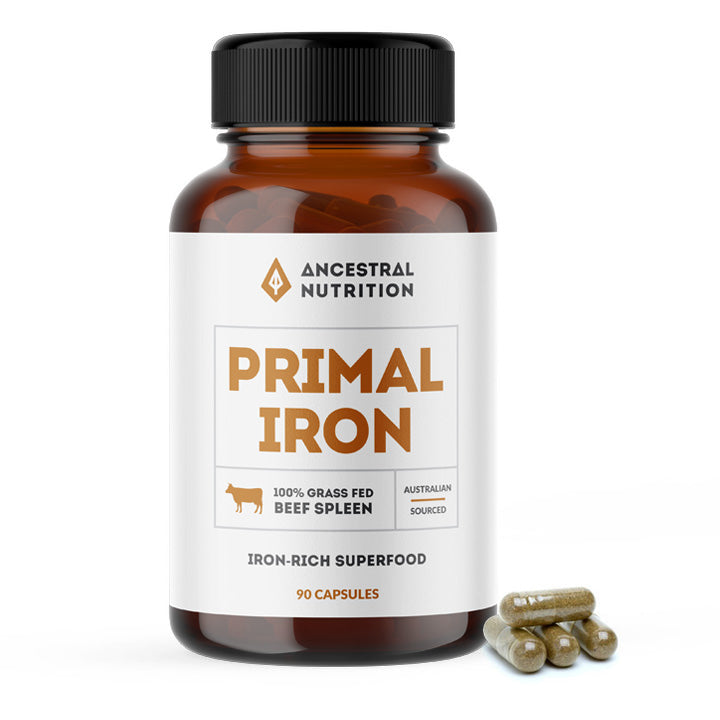
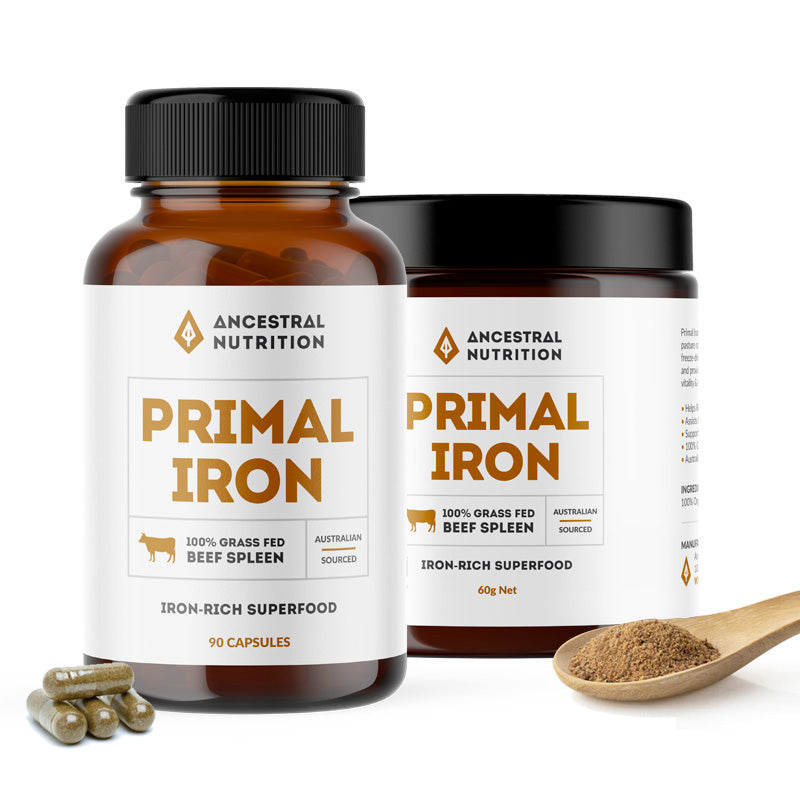


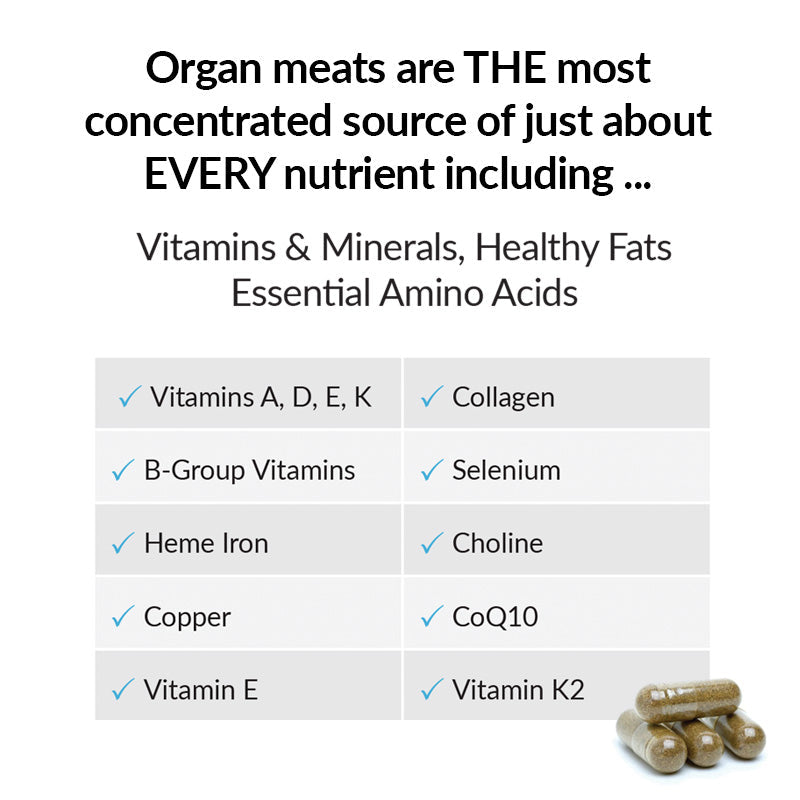







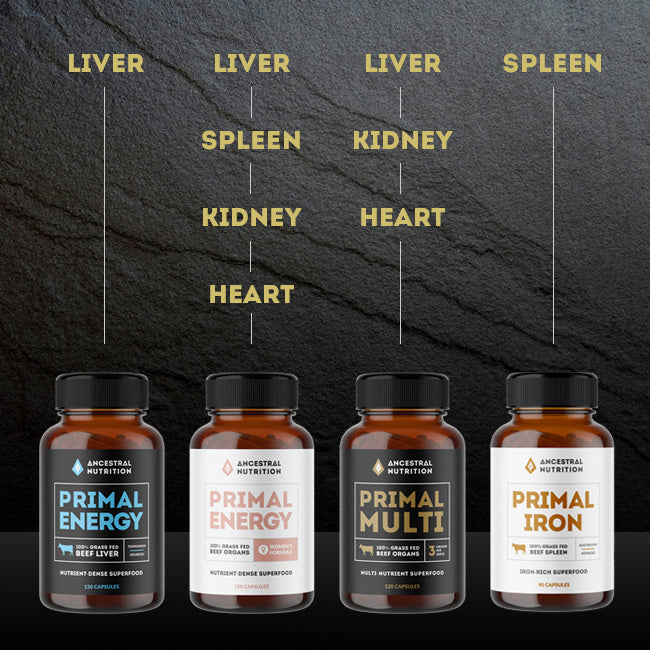
-

100% RDI of Heme Iron
Beef spleen offers a natural, rich and easily absorbed source of heme iron, helping you stay on top of your day.
-

A Natural Source of Iron
Naturally sourced from whole food—ideal for those seeking a gentle, food-based source of iron.
-

Naturally bioavailable
Heme iron is more readily absorbed than plant-based and non-heme iron sources.
Emma Found a Natural Way to Support Her Iron Intake
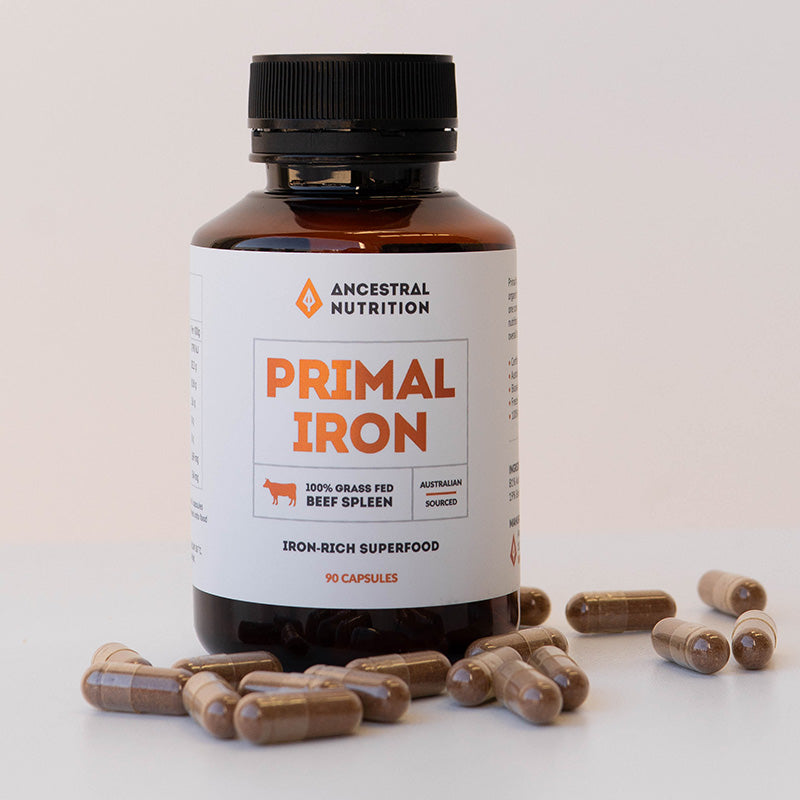
Nature’s Iron-Rich Superfood
Each serve of beef spleen provides a unique mix of naturally occurring nutrients, including vitamin B12, heme iron, selenium, zinc, copper, and small amounts of vitamin C — all found in their wholefood form. Traditionally valued for its role in supporting vitality, beef spleen is a rich source of bioavailable iron.
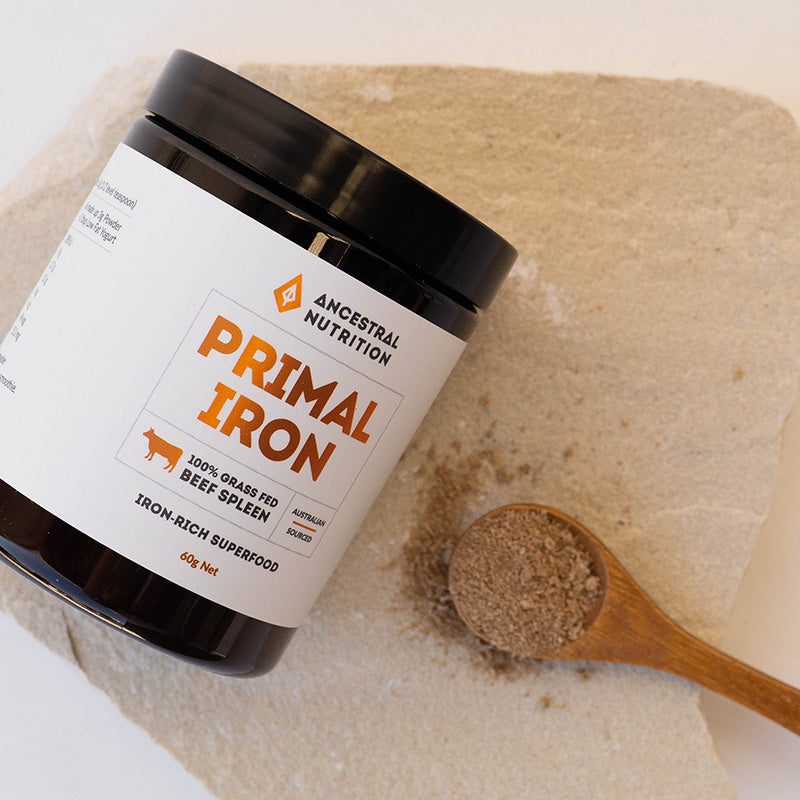
100% RDI Iron per 3g Serve
Iron Benefits (Naturally found in beef spleen):
- Helps your body feel less tired by supporting natural energy production
- Supports the healthy creation of red blood cells, which carry oxygen throughout your body
- Plays a role in keeping your immune system working as it should

Grown in Tasmania. Crafted in Byron Bay.
We use certified grass-fed and grass-finished beef spleen from Tasmanian farmers. It's freeze-dried in small batches and packed in our Byron Bay facility to retain its natural nutrient profile.
Third-party batch tested for quality.
Primal Iron Beef Spleen Capsules & Powder FAQs
What Nutrients Are Naturally Found in Beef Spleen Supplements?
Beef spleen is a traditional wholefood valued for its unique nutrient profile, particularly its naturally occurring heme iron and vitamin B12. When freeze-dried, it retains its full spectrum of nutrients in a form the body can readily absorb — with no synthetic additives or fillers.
Key Nutrients Naturally Found in Beef Spleen:
- Heme Iron – supports normal oxygen transport and contributes to energy production
- Vitamin B12 – essential for red blood cell formation and healthy nervous system function
- Zinc & Copper – involved in immune health and antioxidant activity
- Selenium – supports normal thyroid function and cellular defence
- Small amounts of Vitamin C – naturally present in raw spleen
- Peptides and enzymes – including splenin, which are naturally occurring in this organ
Our beef spleen comes from 100% grass-fed, grass-finished Tasmanian cattle and is freeze-dried in small batches for maximum purity and potency.
How Do Beef Spleen Supplements Taste?
Beef spleen supplements are available in both capsule and powder form — and the taste experience can vary depending on which you choose.
- Capsules: Most people find beef spleen capsules virtually tasteless. They’re an easy and convenient way to get the benefits of organ meats without the flavour. Simply swallow with water, just like any other supplement.
- Powder: Freeze-dried beef spleen powder has a rich, earthy flavour that’s true to its natural source. While some people enjoy the taste in savoury blends, others prefer to mix it into smoothies, broths, or sauces to mask the flavour.
Whether you choose capsules or powder, beef spleen is valued more for its nutrient density than its taste.Tip: If you're sensitive to taste, capsules are the most neutral option.
When Is the Best Time to Take Beef Spleen Supplements?
Beef spleen supplements can be taken at any time of day, but many people prefer to take them in the morning or with their first meal to support daily nutrient intake and energy metabolism.
Because beef spleen is naturally rich in vitamin B12, iron, and other energising nutrients, taking it earlier in the day may help align with your body’s natural rhythm and avoid any potential for overstimulation at night.
Tips for Best Results:
- With food: Taking beef spleen with/after a meal may help improve absorption.
- Consistency matters: Regular daily use is more important than timing — choose a time that fits your routine.
- Start slow: If you're new to beef organs, begin with a smaller dose and gradually increase as tolerated.
Beef spleen supplements are a wholefood source of nutrients, not synthetic isolates — making them suitable for long-term daily support.
How Long Does It Take to Notice the Effects of Beef Spleen Supplements?
The timeline for noticing the benefits of beef spleen supplements can vary from person to person. It often depends on your current iron and B12 status, dietary habits, and overall lifestyle.
Because beef spleen is a natural source of heme iron, vitamin B12, and supportive trace minerals like zinc and copper, some individuals may feel a shift in energy, stamina, or general wellbeing within a few weeks. For others, it may take longer as the body gradually rebuilds nutrient stores.
Factors That May Influence Your Experience:
- Nutrient status: If you're not getting enough iron or B12 from food, you may notice changes sooner.
- Consistency: Whether you use capsules or powder, taking your supplement daily is key.
- Overall diet: Pairing beef spleen with a nutrient-dense, wholefood diet may support better outcomes.
As with any wholefood supplement, beef spleen works best when taken consistently over time as part of a balanced approach to wellbeing — not as a quick fix.
Are Your Beef Spleen Products Free From Bovaer® Feed Additives?
Yes — our beef liver products are sourced from 100% grass-fed and grass-finished, pasture-raised Tasmanian cattle that are not supplemented with Bovaer® or other synthetic feed additives.
We work closely with local farms that focus on natural, traditional grazing practices. This ensures the purity of our products while maintaining full transparency across the supply chain — from paddock to capsule.
No hormones, no antibiotics, no synthetic feed additives — just real food the way nature intended.
Do You Sell Organic Certified Organs?
We often get this question — but the truth is, certified organic organs simply don’t meet our standards for nutritional density, animal welfare, or sustainability. Here’s why:
1. Animal Welfare:
Most Australian organic cattle are raised in arid central regions where only drought-tolerant breeds can survive. These harsh conditions often lead to stressed animals, which can negatively affect organ quality. In contrast, our cattle are raised on lush, rotational pastures in temperate climates.
2. Nutrient Quality:
Certified “Organic” doesn’t guarantee nutrient density. Many organic farms use broad-spectrum fertilisers without soil-specific analysis. We work with trained agronomists who test and manage soil health to maximise nutrient uptake in grasses — and ultimately in the organs.
3. Sustainability:
To meet organic certification, some producers use unsustainable inputs like prawn meal scraped from ocean floors — cheap, compliant, but ecologically harmful. Our approach focuses on true regenerative practices, not certification checkboxes.
We don’t chase labels. We chase results. Learn more on our quality page here.
Is Beef Spleen a Good Source of Iron?
Yes — beef spleen is one of the richest natural sources of heme iron, the form most easily absorbed and used by the human body. A small daily serve provides meaningful amounts of iron to support your dietary intake through real, nutrient-dense food.
Iron contributes to:
- Normal energy production and reduction of tiredness and fatigue
- Healthy oxygen transport via red blood cells
- The formation of haemoglobin
- Normal immune system function
Because it comes in its heme form, the iron in beef spleen is significantly more bioavailable than the non-heme iron found in many plant-based foods.
Our beef spleen is sourced from 100% grass-fed, grass-finished Australian cattle and gently freeze-dried to preserve its naturally occurring nutrients — with no additives or fillers.
Can I Use Beef Spleen Supplements While Pregnant?
Beef spleen is a natural source of important nutrients like heme iron, vitamin B12, zinc, and selenium — all of which play supportive roles during pregnancy. These nutrients are present in their wholefood form, making beef spleen a valuable addition to a nutrient-dense diet for some women.
Unlike beef liver, beef spleen contains no vitamin A, making it an appealing alternative for those mindful of retinol intake during pregnancy.
In Australia, the Recommended Dietary Intake (RDI) for iron during pregnancy is 22–27 mg per day, and for vitamin B12 it is 2.6 µg per day. A standard 3-capsule serve of freeze-dried beef spleen delivers approximately 11.5 mg of ironand a meaningful amount of vitamin B12, helping support these needs through real food.
As always, we recommend consulting your healthcare provider before adding beef spleen supplements to your routine during pregnancy, to ensure they align with your individual dietary needs and prenatal care plan.
Wholefood organ supplements like beef spleen can offer nutritional value — but every pregnancy is different, and personalised advice is best.
How Are Your Beef Spleen Supplements Made?
Our beef spleen supplements are made using a careful, low-temperature freeze-drying process that preserves the natural integrity of the nutrients — without the use of heat, additives, or synthetic preservatives.
Here’s how we do it:
Step-by-Step Production Process:
- 1. Sourced Locally: We use 100% grass-fed & grass-finished, pasture-raised beef spleen from Tasmanian farms that meet strict animal welfare and food safety standards.
- 2. Fresh Processing: The spleen is trimmed, gently cleaned, and frozen shortly after harvest to maintain freshness and nutrient quality.
- 3. Freeze-Dried for Potency: Through sublimation, moisture is removed at low temperatures to preserve heat-sensitive vitamins like B12 and folate.
- 4. Milled and Encapsulated (or Powdered): The dried spleen is finely ground and packed into capsules or jars — with no binders, fillers, or flow agents.
- 5. Packed in Our Byron Bay Facility: We manufacture in-house to maintain full control over quality and consistency, from raw ingredient to finished product.
Every batch is third-party tested for safety and packaged in our purpose-built Byron Bay facility — ensuring transparency, traceability, and trust.
What’s the Difference Between Beef Spleen Capsules and Powder?
Both capsules and powder deliver the same core benefits of beef spleen — but differ in format, convenience, and flexibility, depending on your lifestyle and preferences.
Beef Spleen Capsules:
- Pre-measured and easy to take
- No taste or smell — ideal if you’re sensitive to flavour
- Great for travel or daily routines
- Offers consistent dosage (e.g. 1.8g = 3 capsules)
Beef Spleen Powder:
- Versatile for adding to food (e.g. smoothies, bone broth, patties)
- Slightly more economical per gram
- Mild organ flavour — best for those who are comfortable with natural tastes
- Allows flexible dosing for families or pets
Whether you prefer convenience or culinary creativity, both formats provide the same freeze-dried, nutrient-dense spleen — sourced from grass-fed & grass-finished Australian cattle and made without additives or fillers.
Primal Iron Additional Information
Everything You Need to Know About Beef Spleen
In the realm of alternative nutrition, there's a hidden gem that's often overlooked: the beef spleen. Yes, this organ meat might not be the star of the show, but its health benefits pack a punch that might just make you reconsider your dietary choices. Let's dive into the world of beef spleen, exploring its wonders and understanding why it's a great natural alternative to synthetic iron supplements.
What Exactly is Beef Spleen?
The spleen is an organ that sits quietly in the abdomen of animals, including cows. While it might not sound like the most appealing dish, its nutrient profile is nothing short of impressive. Packed with vitamins, minerals, and proteins, the beef spleen is a powerhouse of nutrients that has been a part of traditional diets across various cultures for centuries.
Beef Spleen: Nature's Iron Boost
Now, let's talk iron. Iron deficiency is a common concern, especially for individuals with specific dietary restrictions or conditions. Here's where beef spleen steps in as a natural alternative. Beef spleen offers the highest concentration of iron from any organ with a single 1.5g serving of freeze-dried beef spleen offering almost 100% RDI of iron!
The bioavailability of iron in beef spleen, particularly heme iron (a type of iron found in animal-derived foods), is specifically advantageous compared to plant-based or synthetic sources due to several factors:
- Chemical Structure: Heme iron, predominant in animal-derived products like beef spleen, has a structure similar to the iron in our blood (hemoglobin). This resemblance allows the body to absorb heme iron more efficiently as it closely mirrors the form of iron our bodies are naturally designed to use.
- Enhanced Absorption: Heme iron, unlike non-heme iron found in plants or synthetic supplements, is absorbed through a distinct and more efficient pathway in the intestines. The body's mechanisms for absorbing heme iron are more effective, allowing for a higher absorption. The absorption rate of heme iron is typically around 15-35%, while non-heme iron absorption is generally lower, ranging from 2-20%.
- Absorption Enhancers: The presence of specific compounds in animal-based foods, particularly meat, can enhance the absorption of heme iron. For instance, meat contains factors that counteract inhibitors of iron absorption present in various foods, further boosting the body's ability to take in and utilise iron from sources like beef spleen.
- Reduced Interference: Non-heme iron from plant sources can be influenced by other dietary components, such as anti-nutrients like phytates and polyphenols, which can hinder its absorption. Heme iron, on the other hand, is less affected by these inhibitors, allowing for a more consistent and higher absorption rate.
The Hidden Costs of Convenience
While synthetic supplements offer a quick fix, they come with a hidden cost in the form of less effective options and digestive issues. Ever heard the saying "too much of a good thing can be bad"? Synthetic supplements often provide an excessive dose of isolated nutrients, disrupting the body's natural balance. Moreover, they lack the holistic nutritional spectrum found in whole foods like beef spleen. It's akin to taking shortcuts—a temporary solution with potential long-term consequences.
Health Benefits Beyond Iron
Beef spleen isn't just about iron. It's a nutritional powerhouse offering a spectrum of essential nutrients. From vitamin B12, which supports nerve function and energy production, to zinc for immune health and protein for muscle repair, this organ meat covers a wide array of nutritional needs in one serving.
The Gut Connection
Interestingly, beef spleen also contains peptides that can support gut health. These peptides may play a role in maintaining a healthy gut lining, potentially benefiting those with digestive issues or aiming to enhance their overall gut health.
How to Supplement with Freeze-Dried Beef Spleen
If you are looking for a natural, whole food and bio-available supplement to boost your iron that includes a myriad of critical nutrients look no further than desiccated beef spleen.
Our Primal Iron Beef Spleen supplements are organic, 100% hormone, antibiotic and GMO-free. Available in capsules or powder form, they provide nose to tail nourishment, are freeze-dried to preserve nutrients and are 100% grass-fed and grass-finished from the pristine Tasmanian pastures.
The Iron Deception
Discover Why Your Iron Supplement May Not Work
Iron is an essential mineral that plays a crucial role in human health, particularly in the production of hemoglobin, the protein responsible for carrying oxygen in the blood. As such, iron deficiency and anemia are common health issues faced by many people, especially women, who tend to lose iron through menstruation. To address these health problems, the vitamin and supplement industry has been marketing iron supplements as a solution. However, what many people are not aware of is that these iron supplements may not be the solution they need, and may, in fact, do more harm than good.
The key issue with many high street iron supplements is that they are often made from synthetic iron compounds, specifically ferrous iron. Ferrous iron is cheap and easy to produce, which makes it an attractive option for supplement manufacturers. However, the problem with ferrous iron is that it can cause a number of adverse side effects, including digestive problems like nausea, vomiting, constipation, and abdominal pain, as well as darkening of the stool and staining of the teeth. In some cases, ferrous iron supplements can even cause iron toxicity, which can lead to more serious health problems.
In addition to the problems with ferrous iron, many of the iron supplements being sold are also lacking in the essential nutrients required for healthy red blood cell production. Specifically, many iron supplements are lacking in vitamin A and vitamin B12, both of which are critical for the production of healthy red blood cells. Vitamin A is necessary for the growth and maintenance of healthy red blood cells, and vitamin B12 is essential for the formation of the DNA in red blood cells. Without these essential nutrients, the body may not be able to produce enough healthy red blood cells, even if it has enough iron.
What Causes Low Iron?
The root cause of iron deficiency and anemia is often not a lack of iron, but rather a deficiency in the nutrients that support healthy red blood cell production.
This includes vitamins and minerals like vitamin A, vitamin B12, B9 (folate), and copper. Without these essential nutrients, the body cannot produce enough healthy red blood cells, and iron levels may become depleted, leading to iron deficiency and anemia.
To address the root cause of iron deficiency and anemia, it is important to focus on consuming a diet that is rich in the nutrients required for healthy red blood cell production. This includes foods like red meat and organs, poultry, fish, eggs, leafy green vegetables, nuts, and seeds. It is also important to reduce foods that interfere with the absorption of these essential nutrients, such as caffeine, alcohol, and processed foods.
In addition to making dietary changes, individuals who are struggling with iron deficiency and anemia may also benefit from taking a comprehensive and bioavailable multivitamin that contains not just iron, but also the essential vitamins and minerals required for healthy red blood cell production. This will help to ensure that the body has all of the nutrients it needs to produce healthy red blood cells, and will help to address the root cause of iron deficiency and anemia.
A word on choosing supplements ... if we follow the principle that it's best to get nutrients from food then it's best to take supplements that are closest to food.
The Bottom Line
In conclusion, the iron supplements being sold by the vitamin and supplement industry are often made from cheap and synthetic ferrous iron, which can cause a number of adverse side effects. Furthermore, many of these supplements are lacking in the essential vitamins and minerals required for healthy red blood cell production.
To address the root cause of iron deficiency and anemia, it is important to focus on consuming a diet that is rich in the essential nutrients required for healthy red blood cell production, and to avoid foods that interfere with the absorption of these essential nutrients. Additionally, taking a comprehensive multivitamin that contains not just iron, but also the essential vitamins and minerals required.
How Can Beef Liver & Organs Support Low Iron & Fatigue
Many people assume that beef organs are simply a good source of iron which in turn helps to fight fatigue. While they do contain heme iron they are particularly rich in vitamin A and B-vitamins, and are also rich in minerals, including magnesium, zinc and copper. These are the building blocks required to support healthy red blood cell production. They also come packed as nature intended in a whole food animal-based source that are generally more bioavailable than plant-based or synthetic supplements.
Is Iron From Plants or Meat Better?
Who remembers Popeye, the wisecracking cartoon sailor who possessed superhuman strength after ingesting an always-handy can of spinach? While Spinach may not provide bulging muscles or super-strength it does provide iron which is an important nutrient for stable energy. A deficiency in this precious mineral can lead to weakness, tiredness and fatigue but we may not need to carry cans of spinach around like Popeye.
In this article we’ll look at the role iron has to play in the body, and examine the different types of iron.
Why is iron important?
Iron is an essential nutrient that plays a vital role in the transport of oxygen around the body. It binds to something called hemoglobin (a special protein) and helps it carry red blood cells from your lungs to other tissues in your body. A deficiency in iron is called anaemia which effects about 20% of women, 50% of pregnant women and up to 5% of men. The easiest solution to avoid anaemia is to consume more foods high in iron.
How much iron do we need?
The recommended daily intake (RDI) may vary based on a person’s gender and life stage but is typically:
- Men over 19 years - 8 milligrams
- Women between 19 and 50 years - 18 milligrams
- Women over 51 years- 8milligrams
- Pregnant women - 27 milligrams
- Women who are exclusively breastfeeding - 10 milligrams
The different types of iron
There are two forms of iron, heme iron and nonheme iron. The term 'heme' is derived from a Greek word that loosely translates to 'blood.' This type of iron comes from animal protein, such as poultry, fish, and beef. Nonheme iron is found in plant foods including legumes, leafy greens, and nuts.
Which type of iron is better?
Your body can absorb heme iron (from animal protein) more readily and is reported to be up to 18% more bioavailable. Nonheme iron, the iron source in vegetarian diets, has a bioavailability of 5–12%. The reason for this is that many plant foods that contain iron also contain phytic acid and oxalates which significantly inhibit the body's ability to absorb iron.
Iron-rich foods
Good sources of heme iron offering around 3.5mg per serve include:
- Beef organs
- Mussels
- Oysters
While sources of nonheme iron offering around 3.5mg per serve include:
- Tofu & Soybeans
- Lentils
- Beans (red, white, kidney etc)
The problem with iron supplements
Supplemental iron comes in many forms. Getting the most absorbable form is the key to preventing gastrointestinal distress and constipation. Ferrous sulphate & ferrous fumarate are the most common form of iron supplements. They're also the least absorbable forms which is why iron supplementation has a reputation for slowing down the bowels. This is the main reason why obtaining iron from food sources are preferable.
Organ meats and iron
As outlined above organ meats are a great source of iron with spleen offering the highest of all. Beef liver also offers a wide range of iron, B-vitamins and is especially high in vitamin A. It's important to note that being deficient in vitamin A may interfere with your ability to efficiently absorb iron which may increase your iron needs.
What Are The Best Iron Rich Foods?
Foods To Boost Your Iron Levels
Eating a balanced and nutritious diet is the key to remaining healthy and avoiding a lot of nutrition-related illnesses. To maintain a balanced diet, we have to include macronutrients and micronutrients.
Macronutrients are the main food groups that the body needs in large quantities like proteins, fats, and carbohydrates. On the other hand, micronutrients are nutrients that the body needs in small amounts like minerals and vitamins. Among the most important minerals is iron.
It is important to ensure the proper functioning of hemoglobin. That is a protein your body needs to transport oxygen to all body parts through the blood. It also transports carbon dioxide from the body parts back to the lungs for exhalation.
The recommended daily allowance depends on our age and sex. Experts recommend the following intake levels for different people:
- Men over 19 years - 8 milligrams
- Women between 19 and 50 years - 18 milligrams
- Women over 51 years- 8milligrams
- Pregnant women - 27 milligrams
- Women who are exclusively breastfeeding - 10 milligrams
There are certain groups of people who need to take more of it than others, including:
- Pregnant women who need it in more volume to promote more blood flow to the baby and developing reproductive organs.
- Young children, especially those born premature or underweight.
- Adolescent girls need more of the mineral because of their rapid growth. They also need it because menstruation could cause a deficiency.
- Frequent blood donors
- People with gastrointestinal disorders, cancer, or heart failure
If our bodies do not absorb the required amounts of the mineral, we can develop a deficiency. This is among the most experienced nutritional deficiencies and the number 1 cause of anemia. Symptoms of low iron levels do not start showing until it progresses to iron deficiency anemia. That is a condition where we get very low iron levels that not enough normal RBCs are made to carry oxygen to our body parts and organs effectively.Some of the symptoms include:
- Fatigue
- Weakness
- Pale fingernails and skin
- Dizziness
- Inflamed tongue (glossitis)
- Headache
While mild deficiencies don’t cause a lot of problems, we could experience some of the following complications if we leave it untreated:
- Heart problems due to irregular heartbeats as the heart tries to compensate for the low mineral levels by pumping more blood.
- Problems during pregnancy like premature births and babies with low weight.
- Slow growth and development in infants.
There are different reasons why we can suffer from iron deficiency, including:
- Blood loss
- Lack of the mineral in our diet
- Pregnancy
- The inability of the body to absorb it
Iron Rich Foods
To boost the levels of the mineral in our bodies, we need to eat foods that have it in higher amounts. We can have it as either heme or non-heme. We get heme from hemoglobin found in animal foods like red meat, poultry, and fish, while we get non-heme from plant-based foods.
Our bodies get the most levels of the mineral from heme sources. Our bodies absorb it mainly via the upper part of our small intestines. Some of the best iron rich foods we should always include in our diets to reduce fatigue include:
Beef spleen & organs
Meat from beef organs, also known as offal, is very nutritious and packed with the mineral iron. Some of the organs include the spleen, kidney, heart, tongue, and liver.
The mineral from these beef organs is bioavailable, which means that it is easily absorbed by our bodies better than when we get it from plants.
Beef spleen is one of the organs with the highest amount of iron, with a 2g serving of freeze dried spleen containing 11.5 milligrams. That represents 100% of the daily value.
Red meat
Eating red meat not only boosts our protein intake but also helps increase our levels of the blood-making mineral. A serving of 3.5 ounces of red meat will leave us feeling fuller for longer and provide us with 2.7 milligrams of the mineral, which represents 15% of the daily value.
Shellfish
Shellfish are not only tasty but also highly nutritious. While all of them have high amounts of the hemoglobin-making mineral, oysters, clams, and mussels are the ones with the highest amounts.
A 3.5 ounce serving of clams, for example, has up to 3 milligrams, which represents 17% of the recommended daily value.
Fish There are a lot of different types of fish we can eat to boost our levels of the hemoglobin mineral. A serving of 3 ounces or 85 grams of tuna has 1.4 milligrams of the mineral, which is around 8% of our recommended daily intake. Turkey especially dark turkey meat, is not only delicious but also a good source of the mineral. A serving of 3.5 ounces of turkey contains 1.4 milligrams, which is our recommended daily intake.
Iron Rich Plant-Based Foods
Non-heme iron can be found in the following plant-based foods:
- Spinach
- Legumes
- Pumpkin seeds
- Quinoa
- Broccoli
- Tofu
- Dark chocolate
Low iron levels in our bodies do not only happen because we are not eating a lot of it, but it could happen because our bodies are unable to absorb it. If that is the case, we should try and increase the levels of Vitamin C in our bodies because it helps with the absorption of the mineral.Some of the foods we can add that are rich in vitamin C include:
- Broccoli
- Kiwi
- Oranges
- Grapefruit
- Melons
- Leafy greens
- Peppers
- Strawberries
- Tomatoes
- Tangerines
As outlined above beef organs are an excellent source of heme iron but can be difficult to source and prepare.
Disclaimer
The information presented on this page is provided for general educational purposes only and is not intended to diagnose, treat, cure, or prevent any disease. Statements about Primal Iron — Grass-Fed Beef Spleen and other Ancestral Nutrition products have not been evaluated by the Therapeutic Goods Administration (TGA). These products are sold as foods/dietary supplements and are regulated under the Australia New Zealand Food Standards Code; they are notregistered therapeutic goods.
Individual nutrient requirements vary. Always read the label, follow directions for use, and check the Nutrition Information Panel for serving size and daily intake guidance. If you are pregnant, nursing, under 18 years of age, have a known medical condition, or are taking prescription medication, consult a qualified healthcare professional before using any new food or supplement.
Testimonials and customer stories reflect personal experiences and may not be typical; results can differ from person to person. Ancestral Nutrition makes no guarantee of specific outcomes.
By continuing to browse or purchase from this site, you acknowledge that you have read and understood this disclaimer and agree to use the information and products responsibly and in conjunction with professional medical advice where appropriate.
























